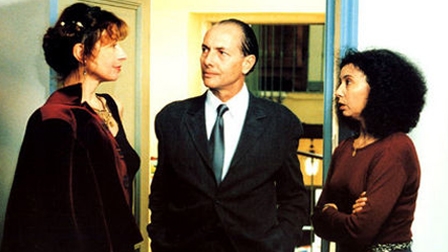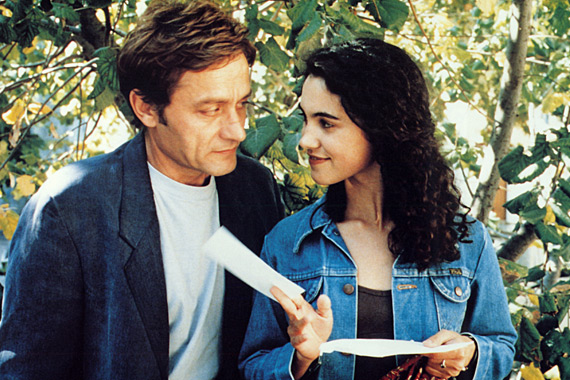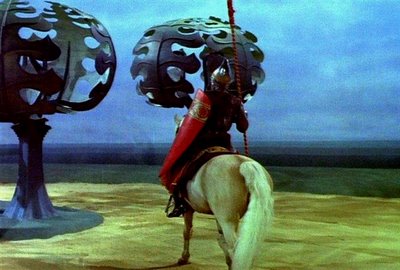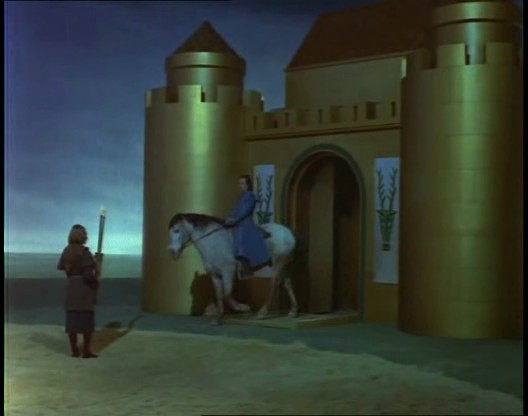Lucidno ERIC ROHMER
MASTER OF REALITY
Eric Rohmer died in early 2010 at the age of 89. (See Dave Kehr’s very fine obituary in the New York Times.) Although my support for his work was often guarded, I hope that I did justice to his importance in this August 20, 1999 piece for the Chicago Reader.
I was distressed more recently to read A.O. Scott assert about Rohmer, in an article about him in the New York Times, that “some aspects of late-20th-century life -– most notably, politics –- were absent from his palette”. This immediately made me think about L’arbre, le maire et la médiathèque(1993), one of Rohmer’s best and most neglected features, although, as Kent Jones subsequently noted on Dave Kehr’s blog, other Rohmer films with(direct or indirect) political content could also be noted. As usual, it appears that Scott is doing what many readers want from the Times‘ film writers: to assure them that their ignorance about certain matters is an “educated” ignorance, even if it isn’t. –J.R. [1/13/10]
Autumn Tale Rating *** A must-see
Directed and written by Eric Rohmer
With Marie Rivière, Béatrice Romand, Alain Libolt, Didier Sandre, Alexia Portal, Stéphane Darmon, and Aurélia Alcaïs.
At 79, Eric Rohmer is obviously a master, though one might argue he was a master 30 years ago when he made My Night at Maud’s. If a part of me has resisted and sometimes even resented his mastery, this undoubtedly can be traced to a problem with realism that his work as a whole throws into relief. To put it crudely, why reproduce the real world when we have the thing itself? In his 1988 book about Rohmer, Australian critic G.C. Crisp summarizes Rohmerian realism: “The cinema is a privileged art form because it most faithfully transcribes the beauty of the real world. The real world is intrinsically beautiful because it is God’s handiwork. Any distortion of this, any attempt by man to improve on it, is indicative of arrogance and verges on the sacrilegious. According to this line of reasoning, beauty is a quality not of art but of the world, so art can never improve on reality; at best, subordinate to that reality, it can shine with a reflected glory. The director’s job is to open a window onto reality, to create a ‘transparent’ cinema which simply presents, with as little interference as possible, the beauty of the world…. “Such a degree of self-effacement on the part of the director constitutes an act of worship analogous to prayer.”
Along with Claude Chabrol, with whom he once wrote the first book-length critical study of Alfred Hitchcock in any language, Rohmer stands in opposition to the other critics-turned-filmmakers of the French New Wave in his absolute fidelity to the way people speak and to the quality of a particular place and time — specific regions, cities, towns, seasons, and times of day. For Jean-Luc Godard, Jacques Rivette, and the late François Truffaut, pursuing a particular mythology and metaphysics is an essential part of filmmaking. Chabrol pursues these things a little — deriving them most often from the mysteries and thrillers he frequently uses as sources — but Rohmer is far too interested in the real to go along with such hocus-pocus. The form that seems to interest him the most is the tale or the fable, conceived as an 18th-century form of crystalline elegance, and the iconography that engages him doesn’t refer to the sort of allegory he admires in the work of Hitchcock or F.W. Murnau (whose Faust was the subject of his dissertation) but to the particular way light falls across a familiar, everyday setting.
Maybe the implicit political conservatism of Rohmer’s realism has made me distrustful. Yet I confess my favorite of all his films might be described as the most reactionary (and the least realistic) — his 1978 Perceval le Gallois, a medieval musical that feels a bit like a western, and a cogent illustration of his stated conviction that a true preservation of the past ultimately adds up to a kind of modernity.





